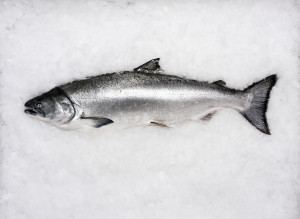A conservation group is criticizing federal and provincial agencies for not publicizing a preliminary test showing the presence of a potentially deadly salmon virus at a New Brunswick aquaculture operation.
The Atlantic Salmon Federation says it heard on Monday that a strain of infectious salmon anemia was reported by an aquaculture company located along the Bay of Fundy.
The virus can be fatal to fish but doesn't cause harm to human health.
Jonathan Carr, the federation's director of research, says he went to the Canadian Food Inspection Agency website but didn't find a report of the incident.
"Without the public knowing what's going on a lot of rumours and wildfires can happen,'' he said in an interview.
"That's where the province and the CFIA should be upfront ... when these things happen, inform the general public on what's going on and how they're dealing with it.''
A spokeswoman for the New Brunswick government said in an email there was a suspected case of virulent infectious salmon anemia detected last month.
"Regarding the suspected case ... the province and the CFIA are aware and are working collaboratively on this,'' Anne Bull said.
"We are in regular contact with the operator, who is co-operating fully on the matter. Increased surveillance and sampling efforts have been put in place by New Brunswick's chief aquaculture veterinarian.''
Pam Parker, director of the Atlantic Canada Fish Farmers Association, an industry group, said in a telephone interview that in March a fish in one cage in a New Brunswick salmon farm was found to be positive for infectious salmon anemia during a preliminary test.
She said the company didn't wait for a confirmation of a final diagnosis by the Canadian Food Inspection Agency and proceeded to remove all of the fish from the pen and notified the provincial and federal regulators of their actions.
Parker said other salmon farmers in the area were notified and the affected farm is in quarantine. She said she didn't know the name of the affected salmon farm.
In an email response, the Canadian Food Inspection Agency said it requires notification whenever infectious salmon anemia is detected.
"All finds are reported online for public consumption,'' said spokeswoman Tammy Jarbeau.
Jarbeau did not comment on any specific cases but said pathogenic strains of the virus occur sporadically, while non-pathogenic strains are to be expected every year in the Atlantic area.
Carr said he's glad that the affected fish were killed quickly after the outbreak but he feels more information should have been released after the preliminary tests.
"It's prudent when you have cases like this to get this out to the public.''
Parker said the regulations and the process are rigorous.
"We don't understand what the concern is,'' she said. "The system is working. There is more transparency in salmon farming than any other food producing sector.''
Original Article
Source: huffingtonpost.ca/
Author: Michael Tutton
The Atlantic Salmon Federation says it heard on Monday that a strain of infectious salmon anemia was reported by an aquaculture company located along the Bay of Fundy.
The virus can be fatal to fish but doesn't cause harm to human health.
Jonathan Carr, the federation's director of research, says he went to the Canadian Food Inspection Agency website but didn't find a report of the incident.
"Without the public knowing what's going on a lot of rumours and wildfires can happen,'' he said in an interview.
"That's where the province and the CFIA should be upfront ... when these things happen, inform the general public on what's going on and how they're dealing with it.''
A spokeswoman for the New Brunswick government said in an email there was a suspected case of virulent infectious salmon anemia detected last month.
"Regarding the suspected case ... the province and the CFIA are aware and are working collaboratively on this,'' Anne Bull said.
"We are in regular contact with the operator, who is co-operating fully on the matter. Increased surveillance and sampling efforts have been put in place by New Brunswick's chief aquaculture veterinarian.''
Pam Parker, director of the Atlantic Canada Fish Farmers Association, an industry group, said in a telephone interview that in March a fish in one cage in a New Brunswick salmon farm was found to be positive for infectious salmon anemia during a preliminary test.
She said the company didn't wait for a confirmation of a final diagnosis by the Canadian Food Inspection Agency and proceeded to remove all of the fish from the pen and notified the provincial and federal regulators of their actions.
Parker said other salmon farmers in the area were notified and the affected farm is in quarantine. She said she didn't know the name of the affected salmon farm.
In an email response, the Canadian Food Inspection Agency said it requires notification whenever infectious salmon anemia is detected.
"All finds are reported online for public consumption,'' said spokeswoman Tammy Jarbeau.
Jarbeau did not comment on any specific cases but said pathogenic strains of the virus occur sporadically, while non-pathogenic strains are to be expected every year in the Atlantic area.
Carr said he's glad that the affected fish were killed quickly after the outbreak but he feels more information should have been released after the preliminary tests.
"It's prudent when you have cases like this to get this out to the public.''
Parker said the regulations and the process are rigorous.
"We don't understand what the concern is,'' she said. "The system is working. There is more transparency in salmon farming than any other food producing sector.''
Original Article
Source: huffingtonpost.ca/
Author: Michael Tutton

No comments:
Post a Comment